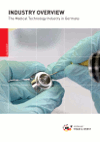 Global demand for innovative medical technology solutions continues to grow as we live longer, healthier lives. "Medical devices made in Germany" make a significant contribution to enhancing patient health care and quality of life around the world. Medical technologies developed in Germany benefit from a world-class research and business environment, with the sector's predominantly small and medium-sized companies enjoying an international reputation as innovators and market leaders. Internationally, the "Made in Germany" seal continues to be held up as a guarantee of quality; nowhere more so than in the medical device sector. In 2012, global demand for German quality saw almost 70 percent of medical technology products being exported to international markets. Domestically, more than 99 percent of the country's 80 million residents are covered by health insurance. Annual health care expenditure in Germany accounts for EUR 294 billion. In addition to expenses reimbursed by health insurance providers, Germans spend an estimated EUR 60 billion for health care out of their own pockets.
Global demand for innovative medical technology solutions continues to grow as we live longer, healthier lives. "Medical devices made in Germany" make a significant contribution to enhancing patient health care and quality of life around the world. Medical technologies developed in Germany benefit from a world-class research and business environment, with the sector's predominantly small and medium-sized companies enjoying an international reputation as innovators and market leaders. Internationally, the "Made in Germany" seal continues to be held up as a guarantee of quality; nowhere more so than in the medical device sector. In 2012, global demand for German quality saw almost 70 percent of medical technology products being exported to international markets. Domestically, more than 99 percent of the country's 80 million residents are covered by health insurance. Annual health care expenditure in Germany accounts for EUR 294 billion. In addition to expenses reimbursed by health insurance providers, Germans spend an estimated EUR 60 billion for health care out of their own pockets.
With its state-of-the-art infrastructure and its central location in Europe, Germany is also an ideal location for serving surrounding European countries with an additional potential market volume of more than EUR 1,300 billion.
Download from eHealthNews.eu: Industry Overview: The Medical Technology Industry in Germany (.pdf, 2.782 KB).
About Germany Trade & Invest
Germany Trade & Invest is the economic development agency of the Federal Republic of Germany. The organization promotes Germany as a business and technology location and supports companies based in Germany with global market information.